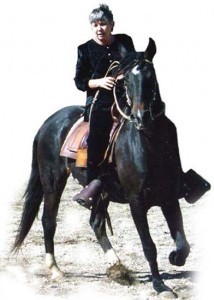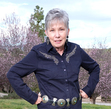Sandy Nathan's Blog, page 10
June 19, 2011
Being a Successful Author Using Social Media, Plus Online Etiquette, Spamming, Cyber-bullying, and Avoiding the Dangers of On-line Particpation
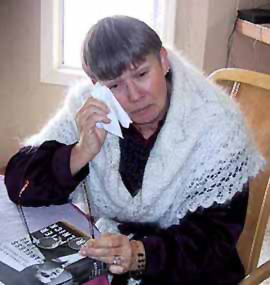
Life Is Rough: Being a Successful Author Requires Skill. (Please note that what I'm crying about is Elvis' Presley's autobiography, on the table before me, not anything bookish.)
Skillfully using social media is a major key to success as an on-line author. That's what all the book industry experts say––and I know people who have parlayed on-line eBook book sales into contracts with major publishers and top literary agents. They've created the top-selling literary careers that other writers, indie press owners, and self publishers want. Careers that even bestselling authors who have literary agents and are published by traditional publishers want.
How? I have no idea. I know how to win book contests––seventeen of them to date––and produce exquisite books that get five star reviews. I'm working on sales. (Ahem.)
For answers about the sales part of it, I'm asking my friends––some of the most successful writers selling on-line––what they do that works so well. We'll be hearing from them in the coming months. I'm also going to ask the top-selling authors if their writing success has made them happy. Really happy, the way I define it down below. Happier than they were before succeeding.
OK. Let's drop the search engine optimization-laden verbiage and get down to it. (And that intro and article title are about as SEO sticky as you can get. SEO is my latest thrill.) This blog post has been grinding around inside me. I've been trying to distill what's bothering me and what I want to say. I'm going to put it out as a series of articles, the first one centering on on-line participation and getting mangled, which happened to me recently.
YourShelfLife.com is about achieving success and sanity as an author or writer. In the publishing world, success is measured by two things: the number of books sold and the amount of money made selling them. If you want to test this, go anywhere that authors or writers congregate. Check out my Facebook wall (or yours). Authors crow about their book sales and big events and triumphs as they happen.
Sanity is harder to define. If you want to get picky, you can always take the MMPI, Minnesota Multiphasic Personality Inventory (or have it administered by a clinical psychologist). The MMPI is a great tool to determine what type of psychopathology the taker has, and how much.
My less precise but way more illuminating definition of sanity is contained in a series of questions: Are you happy? Not the kind of manic, hysterical happiness shown on TV quiz shows. Are you really happy, deep-in-your-gut happy? Do you feel your life is meaningful and that you are traveling in a direction which is taking you closer to the person you were meant to be? Do you feel in communication with God, if you believe in God, or whatever you consider the source of the universe? Your Higher Power? The Great Bazonga in the Sky? Are you in touch with That?
So here's the question: Is it possible to be successful and sane in the writing profession? Writing is hard. Getting published in a professional manner is harder. (Whether you self-publish or go the traditional route.) In my experience, marketing is hardest of all.
I've talked to other writers about this. They say the same thing: "I dunno. I'll tell you when I figure it out."
One of the personally/spiritually positive things about writing is the fact that it continually challenges you to do terrifying things. And learn stuff that you never, ever would have thought about before. Or wanted to. Like search engine optimization. Leading. Do you know what leading is? Do you know which printer gives you the best price on copies of your book and the best distribution? How to set up and write a blog? You learn things like this as your career progresses.
OK. What happened to me on-line the other day? I have certain terrors, like everyone else. Things that are hard and scary that I have to force myself to confront. We all have such things. For some of you, running into the creature below would be terrifying. Getting up close and personal with him, learning to take care of him, lead him around, saddle him, and ride him might put you into intensive care:
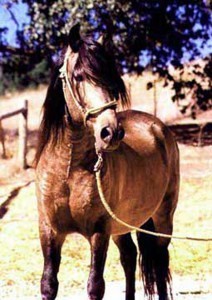
Capoeira BSN, a Peruvian Paso Stallion
Working around Cappy does not bother me, particularly. (Especially since he's in Australia.) You have to pay attention when you're around a stallion, but he's manageable. This is my personal source of terror, what makes my knees go weak and my eyeballs shake:

Kindleboards Home Page
One of my friends, an extremely successful author, gave me clear instructions on what to do to succeed in internet marketing.
"You have to get on the Kindleboards. Go out, introduce yourself, make friends. Don't talk about your book much. Get to know people first. Establish a presence on-line. People will get to know you. Then they'll buy your book." A couple other people said the same thing. And I've heard it on-line.
OK. Gave it a shot. Opened the Kindleboards site and was confronted by the biggest, most complicated and (to me) least user friendly web site I have ever seen. I managed to sign up, stagger into the writers' area, and attempted to register my books. It took me maybe five tries. I did it wrong––putting my books on separate pages, which it seemed that other authors were doing. They were supposed to be on one. Finally mastered that, with various emails from the moderators. I was ready to leap into the 500 million forum threads, all with different rules.
Lord, have mercy! I haven't been back, even though I suspect worlds of meaning or something exist on the Kindleboards.
After that experience, I thought I'd try Goodreads, another big site for readers and authors. I have over 1,000 friends there, somehow, but I've not been on their forums (or any forums) much. I was delighted to see that they had reader groups with subject areas like those of my book, The Angel & the Brown-eyed Boy, which can be put in the science fiction, visionary fiction, or fantasy slots.
I carefully read the posting instructions and put notes in the forums for the three categories The Angel fit. "Hi, I'm Sandy Nathan, I wrote The Angel. It's about . . ." And then I set up a page for the book itself. I immediately forgot what I'd posted and where. It was late and I was exhausted. But I was delighted that I'd gotten that far and thought this on-line stuff would be clear sailing from now on.
The next morning, I was greeted by a politely stated, but pointed, email from someone who said I'd spammed him the night before with 6 emails into his box. That people found that offensive and that I should post once and repeat with weekly or so intervals. Although the note was polite, it hurt. I was stung.
Because I'd followed the rules, I looked them up and read them. I wrote back to the spammed man, groveling, and he wrote back. Then other people on the forum wrote about what happened. It turned out the fellow who thought I'd spammed him was on a number of groups, the same ones I was on, and since I'd posted to those, a separate email had been sent to him from each by Goodreads. I hadn't done it.
So the culprit was Goodreads programming, not me. The group decided I was innocent and would not be executed.
Lord have mercy, again!
This situation got handled. The guy who wrote the email and I have communicated. He even bought The Angel. Things are cool.
But is this anything for a 65 year old woman with two master's degrees to be doing with her life? I ask myself this all the time. I'd love to hear your thoughts and feelings and adventures in the world of on-line marketing. And writing in general. Blogging.
I'm going to have articles on the psychology of the internet, success, and more later.
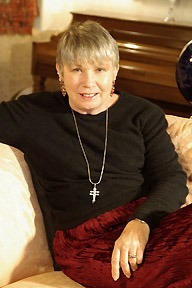
SANDY NATHAN Award Winning Author of The Angel & the Brown-eyed Boy, Tecolote: The Little Horse That Could, Numenon & Stepping Off the Edge
All the best,
Sandy Nathan
May 17, 2011
What Inspires You? Roberta Gately, Author of Lipstick in Afghanistan, Writes About Inspiration
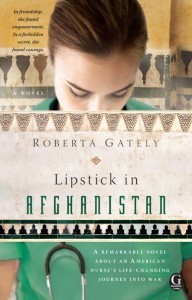
Lipstick in Afghanistan by Roberta Gately
I'm thrilled and honored to introduce today's guest blogger. Roberta Gately is a modern heroine. She has put herself in some of the most demanding and heart-wrenching spots on the planet, serving as a nurse in third-world countries, including Darfur and Afghanistan. She has written extensively on the subject of refugees for The Journal of Emergency Nursing as well as a series of articles for the BBC World News Online. She speaks on the plight of the world's refugees and displaced and has appeared on Fox News in Boston and other TV and radio programs. Gately lives in Boston where she works as a nurse at The Boston Medical Center.
While these credentials are impressive enough, Gately is an incredibly fluid and elegant writer who has completed her first novel, Lipstick in Afghanistan. The novel is based on her experiences as a nurse in Afghanistan after 9/11. I'll give you more information about her book after we hear from her.
I'm going to intersperse her article with photos showing her at work in Afghanistan. I think you'll find the images as impressive and moving as I did. First, let Roberta Gately tell us where she finds inspiration.
Sandy Nathan
YourShelfLife.com
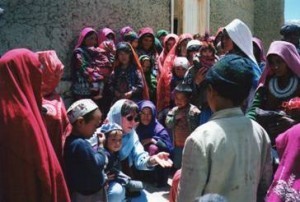
Roberta Gately and Afghan People
INSPIRATION…
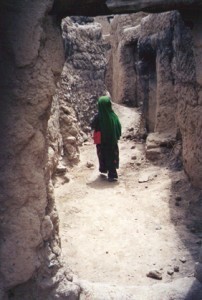
Girl in a Bombed Out Alley
Inspiration – that elusive gem, that idea that transforms our thoughts and our maybes into the essential themes of our stories. But, from what magical place does that indefinable pearl emerge? For me, as a nurse and humanitarian aid worker, I find inspiration everywhere. I stand in line at the bank and watch as a woman peers into a glass shelf, and seeing her own reflection, preens with undisguised admiration. I write furiously. I want to capture the set of her eyes, the slight grin as she realizes how much she likes her own image. Everywhere I look there is inspiration and, eager to record it all, I am never without a pen and paper.
When I first went to Afghanistan, I knew at once that everything there was inspirational, not just the people, but the rugged landscape, the steaming green tea, all of it sustenance for this writer's soul. Afghanistan is a place bursting with inspiring people and inspiring stories at every turn, and my first novel, Lipstick in Afghanistan, was written not just to share my images of that land, but to help dispel the ceaseless illusion that the people of Afghanistan are either terrorists or wild eyed peasants. While Afghanistan's ethnic and border wars have long shaped its violent and stubborn history, it has unfairly colored the world's view of its citizens as well. But the reality is that the Afghans I know are at once both resilient and graceful, and it was those diverse, dissimilar and ultimately inspiring qualities I hoped to bring to my story.
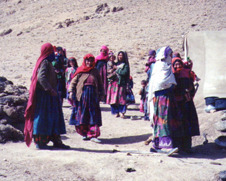
Afghan Women Walking to the Mobile Clinic
Until 9/11, Afghanistan was essentially off the world's radar screen. People knew little and cared less about a land that seemed so alien and so far away. All of that changed of course after 9/11, and as the world's attention finally focused on that destitute and long neglected corner of the world, the devastating truth of the Taliban rule began to emerge; torture, murder and unspeakable crimes against these people. It was worse than any of us who knew the country well had imagined.
In the spring of 2002, I volunteered with a French aid group and was posted to a remote region of Afghanistan, and I was struck, not for the first time, by the wretched reality of daily life for Afghan women. While they have quite literally woven and then held together the fabric and traditions of their families and country, they have often been invisible – the last ones fed, the last ones heard, the last ones to really matter. They suffered at every level, and under the Taliban, access to health care for women had been severely restricted. As a result, Afghanistan had one of the highest maternal mortality rates in the world. UNICEF recently reported that an Afghan woman dies of complications related to childbirth or pregnancy-related complications every twenty minutes, a fact that still my makes my heart ache.
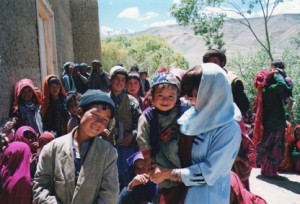
Mobile Clinic
And yet, despite it all, these are women who inspire with every breath they take, for instead of living with bubbling hostility, the women of Afghanistan choose to live with a quiet grace and a hardiness of spirit that takes my own breath away. And even with their countless recent miseries, the women of Afghanistan are nothing if not resilient, and that is especially evident in the long-standing myth of the lady rebel. The lady rebel is revered – a warrior for goodness, they say, whose exploits are legendary, whose reputation for courage is boundless. She is said to have slain more Taliban fighters, and saved more of her own countrymen than her male counterparts. To hear the stories of this remarkable warrior is to believe. Even now, I can almost see her as she flies on horseback across the top of a distant mountain range, her plaited hair flying out behind her, a bandolier strung across her chest, a gleam of determination in her eyes as she saves her countrymen from one calamity or another.
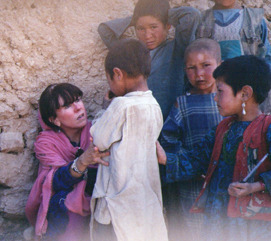
Roberta Examining a Child
That intriguing legend was the seed, the beginning of my idea for Lipstick in Afghanistan, but the lady rebel was only one of many inspirational characters I encountered there. I often spied a tiny young girl as she trudged along the village pathways and fields. This young girl, who was destined to live a life of drudgery, of endless chores and arranged marriage, never missed an opportunity to pummel whatever local boy crossed her path. For a female who was surely destined for a life of never-ending work, it seemed to me that she was releasing a lifetime of power in the short time she had to be free, really free. She had a mischievous, engaging spirit that gave me hope for Afghanistan's future, and gave me yet another seed for my novel.
But Afghanistan is a place filled with possibilities, with achingly sad stories, where even a rock can be a source of inspiration.
But there is inspiration here as well. I find it in my patients struggling to get well, or in the faces of the fretful refugees I know. I find it too in rush hour traffic and in lines at the bank. The world is filled with miracles and with inspiration, and I hope that everyone, especially writers, finds their own miracles and shares them with the rest of us.

Roberta Gately
Roberta Gately
Author of Lipstick in Afghanistan
Published by: Simon & Schuster
Continued below . . .
Are in interested in knowing more about Roberta's novel?
"Absorbing debut… In this utterly engrossing read, Gately vividly evokes
the beauty and tragedy of Afghanistan."—Booklist
"Engaging characters…an informative glimpse into the lives of women in challenging times."—Library Journal
Reminiscent of A Kite Runner, Reading Lolita in Tehran and Three Cups of Tea, Lipstick in Afghanistan takes readers through war-torn Afghanistan and deep into the lives of a people brutalized by the ruthlessly violent Taliban and subjugated by poverty and squalid living conditions.
East meets West in this compelling tale of two unlikely friends: Elsa, a volunteer nurse from Boston and Parween, a young Afghan widow whose husband was murdered by the Taliban. Parween is loosely based on a long-rumored lady rebel in Afghanistan—a warrior for goodness, they say. Her exploits are legendary, her reputation for courage boundless.
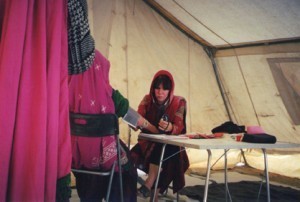
Roberta Gately Seeing Patients in Afghanistan
When naïve Boston nurse Elsa Murphy volunteers at an aid agency, she thinks it's a good way for her to fulfill her lifelong dream of helping others and seeing the world. But a few months after September 11th, she is sent to Afghanistan to serve a year in the trenches, and is forever changed by the bond she makes with Parween, who exhibits unyielding resolve to fight back against the despotism that is the scourge of women of her country.
Told from the alternating points of view of both Elsa and Parween, Lipstick in Afghanistan gives readers a raw and personal glimpse of the war in Afghanistan from the perspective of everyday women who are trying to hold together their families, their friendships, and themselves. And even through the horror of war and differences of culture, Elsa and Parween form a bond forged out of their commonalities, which transcend their differences.
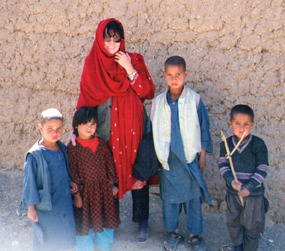
Roberta Gately and Young Afghan Children
Lipstick in Afghanistan describes the cruel reality a people face, especially women, whose lives are brutally oppressed by the Taliban and by the harsh squalor of their living conditions. Yet, the bonds forged by Elsa and Parween are a testament to the power of friendship and of the human spirit to transcend cultural differences, poverty and misery.
May 12, 2011
Over the Edge by Brandilyn Collins: A Your Shelf Life Review
[image error]

Brandilyn Collins
Five stars! Highly recommended: A real life witch-hunt scarier than any vampire or zombie tale
My reading group consists of twelve women. At one time, four had Lyme disease. When I told my doctor about what I thought was an horrific incidence, he said, "Lyme disease doesn't exist in this county."
So I had some idea of the situation before I began Brandilyn Collins' Over the Edge. I didn't know that she would deliver a thriller scarier and faster paced than any vampire story.
The villain? An infected insect less than 1/4th inch in length that you could pick up from a bush in your backyard.
Or that a vengeful maniac could use as a biological weapon.
In Over the Edge, Brandilyn Collins tackles the natural human tendency to attack those least able to defend themselves. This goes along with the propensity to blame innocent people for their disabilities. In the old days, this tendency expressed itself in witch-hunts. Now we see it with cries to balance governmental budgets by cutting public support to mothers and children.
Collins points out a new form of persecution: The unwillingness of influential portions of the medical profession to acknowledge that Lyme disease can have long-term debilitating effects. The refusal has resulted in insurance companies cutting off payments for long-term treatment. Some doctors who have continued to treat chronic cases of Lyme have lost their licenses.
It's such a crazy scenario to anyone who's seen people suffering from chronic Lyme disease that it seems like something out of Kafka. Yet it's true.
Collins' fights the insanity around Lyme disease with an imaginative, totally believable story that thrills as it imparts information. I could have read about the disease for days without understanding its impact on those who have it. When I read about her main character, Janessa McNeil, struggling to get off the floor in her own kitchen or trying to remember a few words, I get it.
The plot is complex, fine-tuned and surprising. Collins' writing is simple and elegant. It conveys the emotional impact of the disease powerfully. Heroine Janessa McNeil presents herself as a strong woman in the direst circumstances. I'm not going to say anything more about the plot; I don't want to spoil its surprises.
In writing Over the Edge, Brandilyn Collins neatly handles a couple of potential writing snafus that drive me nuts.
The book is sited in Palo Alto, CA, the Stanford Medical Center, and the vicinity. I lived in Palo Alto for six years and in towns within twenty minutes of it for most of my life. I've been treated in Stanford Hospital several times; I've worked at Stanford University.
When an author locates a book in an area I know well, I want to feel like I'm back on my home turf, driving down the streets with her as she describes the scene. I want to feel a jolt of recognition when the landscape and sociological terrain is depicted accurately.
Some authors make mistakes that any local resident will pick up, citing highway names incorrectly and portraying routes that don't exist. That inaccuracy makes me doubt the writer and the story.
Collins gets it right. I felt like I was cruising down El Camino Real as she describes Palo Alto's major thoroughfare. I felt secure with the book's deftly handled details and relaxed into the story.
I was not aware that Collins was a Christian writer when I began this book. As a Christian and a writer, I have strong feelings about the way Christianity and spirituality are portrayed. I hate it when a writer takes me 300 pages into a novel only to turn the book into a vehicle for talking about Jesus. That feels like a con. Just as bad are "spiritual" authors who have angels, devils, miracles, and divine interventions hopping out on every other page. That's doesn't fit my religious experience at all.
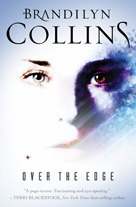
Over the Edge
Collins's description of her character's interior state as she reaches for the Bible is absolutely spot on. The way Janessa uses Scriptural passages and holds on to particular words or phrases in her despair fits my experience. I felt the parts of the book laying out spiritual phenomena were excellent, indeed among the best I've read.
While Collins' book focuses on the inability of some members of the medical profession to recognize obvious illness, Lyme disease is not the only place the profession shows its dark side. DID, dissociative identity disorder, used to be known as MPD, multiple personality disorder. DID is a rare condition occurring only in people who have been subjected to extreme trauma from which they cannot escape. Torture and severe sexual abuse in childhood are primary causes.
For some reason, a portion of the medical establishment has made discrediting the existence of DID a crusade. We have prominent psychiatrists and psychologists devoting their careers to proving that Eve didn't have three faces. This has implications in the insurance industry and means that some people with the syndrome can't be treated. It also could mean acquittal for a wealthy perpetrator being sued for abusing his child. "What's the problem? DID doesn't exist. It's in her head."
I have a friend who is a psychotherapist specializing in treatment of trauma. Her clients include people with DID. My friend told me that, if you read the research results and papers of professionals disputing the existence of DID, they make a good, rational argument. What they say seems true. But if you're face to face doing therapy with a person with the disorder, it's a whole different story. Reality is more powerful than research.
That makes two areas where some of our physicians, those who should be devoted to healing us, are contributing to illness and denying sick people treatment. How many more exist? Why would physicians behave like this? Brandilyn Collin's book shows us a few compelling reasons: professional jealousy, excessive ambition, and the desire for professional advancement. Financial gain if a vaccine or treatment that solves "the real problem" can be created. Or the joy of proving a woman isn't sick––the way she says she is––in court. Or maybe it's just plain viciousness and evil.
May 8, 2011
How to Win a Book Contest — Hot Tips as the Results of the 2011 Contests Are Announced
Mother's Day, May 8th, 2011.
As I write this blog entry, I'm the winner of fourteen national book awards. Just days ago, my book, Tecolote: The Little Horse That Could won the 2011 Silver Nautilus Award for Children's Nonfiction (Grades 1-6). The Nautilus Award recognizes books that promote spiritual growth, conscious living & positive social change. I love that, because that's what I'm trying to do with my writing.
On May 5th, my sci-fi, fantasy, visionary fiction novel, The Angel & the Brown-eyed Boy, won the the 2011 IPPY (Independent Publisher) Gold Medal for Visionary Fiction. The IPPY Awards contest is one of the largest and oldest competitions for independent presses––in fact, it may be the oldest and largest. I'd previously won Bronze and Silver Medals, but never a Gold.
The books are in two more contests that have not yet declared winners, so I may have more awards by the season's end.
Why am I telling you this? Winning is thrilling, for one thing. It's worth letting people know about. Plus, all the articles say you should write about topics that you know about.
I know how to win book contests. I'm going to share my "secrets" with you here.
After you've read this article, you may decide you would rather do anything than try to win a book contest. I used to be a straight A student. One of the guys in my class looked at my notes and saw what I did to maintain my 4.0. "I don't think I want to be an A student," he said, looking slightly green.
Winning takes a lot, you'll see. I'm going to start with two basic questions:
How do you enter a book contest?
The contests that I'm talking about are contests for independent publishers, small presses, and self published authors, though "the majors"––the big, traditional publishers do enter some of them.
I'm not talking about the Pulitzer Prize, National Book Award, the Nebula or Hugo Awards, the Booker Award, or the Nobel Prize for Literature. Professional associations and literary big-wigs nominate books for these are awards; you don't sign up for them.
I was talking about contests for indie authors and presses on a forum once. Some guy posted a list of the big-big literary awards, intimating they were the only ones that mattered. If that's how you feel, go back and get your MFA at Iowa or your PhD in literature somewhere and have at it. You might ask the universe for a brain re-do, too, giving you an English aptitude in the 99th percentile.
Let's stick to what's doable.
To enter a book contest, pick one you want, go to its website, fill out the forms and pay your money. Send them your book and whatever else they want. Voila! Your entered.
Here are a couple of web sites with lists of book contests. I've entered many of these.
Publishing Basics: A Book Award Adds Value to Your Book
The awards have specific calendars relating to the publishing year and copyright dates. Some are for the previous year's books. So it's 2011; this year, the Benjamin Franklin Awards accepted books with 2010 copyrights. The contests have final dates, after which you cannot submit a book. Most of them close in, maybe, February or March, others are later or earlier. Check your dates and your copyright data to make sure you comply. They often have big ceremonies at the BEA Book Expo America, the largest book trade fair in the US. The BEA is a trip. Like a huge party for all the book glitterati. With free books! All you can carry.
Why should you enter a book contest?
Now you know how to win a book contest. Why should you enter one? What will a book award do for you?
I've read promotional materials that claim that winning an award will catapult your book into the ranks of best sellers and make your name as an author.
Hasn't worked out that way for me. I do have a friend who read my earlier article on this subject, Win Book Contests –– Make Your Book a Winner! on Your Shelf Life, this very blog. He took my advice and had his self-published book made into a hardback, entered it in a contest, and won. He was signed by a traditional publisher within weeks. Years later, he remains signed and happy and selling like crazy.
It can happen. (The other thing about my friend is that he's a supreme marketer and his book sales were spectacular before and after the contest. Also his book is really good.)
While I don't promise life-changing results, here are a few reasons book awards are worth pursuing.
1. An award will increase the visibility of your book. My first book came out in 2007; the second in 2009. I've just brought out two more books. I've found it much harder to make sales and keep sales momentum going now than in earlier years. I think that the difference is due to the phenomenal increase in the number of Indie books and authors and their marketing activities. Your book must stand out from and above the hordes.
An award can provide that essential difference, provided it's part of a marketing arsenal. The unspoken truth about book awards is that you have to put your winning book, with its pretty new sticker or badge, in everyone's face and keep it there, or nothing will happen.
2. Goodies. Some contests have really good prizes. Money, publicity campaigns. Trips to holy places: Book Expo America, for one. These are worth competing for by themselves.
3. An award can be a badge of quality and reassure your buyers. I was participating in an on-line discussion the other night when a woman EXPLODED about how sick she was of buying poorly produced self-published books. Here's a really good, though rude and insulting, blog article with an incredibly vulgar title that talks about this problem and presents an excellent critique of self-published books. (Read the comments and links beneath the article. They're also good.)
We in the self-publishing/independent press world need to face this problem and police ourselves. I think that book awards can do exactly that. An award-winning book should represent the highest quality available in the indie/self-published book scene.
Now that we've established good reasons for entering book contests, how do you win?
I'm going to give it to you straight. Winning a book contest requires a huge investment of time and a relatively large investment of money. It takes years to prepare a book good enough to win. Getting the peripherals––your web site, blog, and press packet, with everything it includes––can take more years if you do it yourself.
As an example, I started my new book, The Angel & the Brown-eyed Boy, in January of 2008. I've worked on it full time since then, except for when I was working on my other new book, Tecolote: The Little Horse that Could. Tecolote was supposed to be a redo/upgrade of an eBook we already had that would take two weeks. Hah! What a joke. I worked on it for almost a year.
I've been in constant communication with book designers, proofreaders, editors, graphic artists, web people and more, for three years. I've even been in touch with Tecolote, the horse behind the book.
I don't know how my new books will do in contests; the results aren't in. Because I did well at one time doesn't mean I will again. No guarantees in life. I'm not guaranteeing you anything in this article, either.
Now that I've made you really happy, let's get into the nuts and bolts of winning.
The key is: If you win a book contest, you already know how to set up a winner. You know what excellence is and you know how to bring it forth. Getting the result is a job of work, like mucking out stalls at our ranch. Or getting straight As.
I think I've done well in book contests because I used to show horses and win. When you win in a horse show, it's because you started with a winning horse, then schooled, conditioned, fed, bathed, and trained him to perfection. You know all the rules as to the type of equipment and attire you should be using, and you employ them. You know how to ride and enter the arena with all sails flying. The judge will recognize you the instant he sees you.
In a book contest, the judge faces an array of books. Your book has to leap out and SING. Also tap dance.
HOW DO YOU GET A BOOK TO TAP DANCE?
1. Hardbacks show up better. You're a judge. Thirty or forty books are sitting on a table. You won't be able to read all of them. You see a well-designed hardback with a killer cover. Your eyes and hands gravitate to it. Wow. It's beautiful. The paper even feels classy. You put the book in the "keeper" pile. Hardbacks have more weight in competition.
This is changing. The hardbacks do show up better, but so much contemporary fiction is put directly into a trade paperback (and eBook) format that well-produced soft backs can also win.
(I have experience judging a book contest, which is one reason I know all this stuff. I can't say anything about the contest except that the quality of the books was fantastic. And the winners showed up immediately.)
2. Your title and cover will make you a winner or sink you. Do you know how to judge a cover? Lewis Agrell of The Agrell Group, wrote a terrific article on what makes a winning book cover. Contact Lewis here. (He's really good, by the way. He did the covers and interiors of The Angel & Tecolote, plus other work for me. One sheets, etc.)
For a quick tutorial on commercial design, let's look at phone book ads. Open the yellow page ads in any phone book. Scan the page quickly. Where do your eyes land? Note the ad. Do it again on another page, and another.
In all probability, the ad that draws your attention is simple. Uncluttered. Either black, white, or mostly empty. The ads that grab your eyeballs and hold them have attained page dominance. People hire consultants to create dominant ads for them.
Now go to a bookstore sale table and look at the books. Which books grab your eyes? Which do you pick up? Buy? A book contest is like that table. Clear, bold design that dominates the competition will win.
Your cover must have an emotional hook. Think archetypes. Primal images. Something that grabs the inner psychology of your reader/judge.
To win and much more importantly, to be purchased, your book cover and spine must dominate any table and any bookshelf.
3. Your title is really, really important. Your title embodies your book's essence. It is the first text the reader sees. It should be engaging, easy to read, evocative, and compelling––it should set the emotional tone for your book. As should the subtitle or tag line (the one line description below the title). Also, most of the big catalogs of books will list your book by its title only. It better be memorable.
4. The words on your cover, flaps, and first few pages of your book, your book's copy, should be unforgettable. These words are your prime real estate and are what will make your book succeed. The book contest judge, book store owner, and your buyer will make a decision about your book based on these words––in seconds. You want emotional hooks, ease of reading, and enchantment.
Writing copy is a skill. You can write text like an angel and not be able to pump out a winning tag line. Emmy-nominated screenwriter Laren Bright, the best copy writer I know, wrote an article about "The Most Important Writing in Your Book." It's copy. That's what sells the book.
I say: Hire it done if you can possibly afford it. Copy writing is like writing good poetry. You need to be able to produce succinct messages packed with meaning and emotional associations in a tight space.
5. Book design, interior & exterior: Your book should look like Random House produced it, no less. Every page and every word should be as well designed as your cover. Go to a book store and look at bestselling books. Get a copy of the Chicago Manual of Style––a gigantic book that lays out everything about books––and make it your best friend.
A very important note: Never have your title page on the left side of the book. Do not do that. (I saw books with this flaw in the contest I worked on. This is such a bad error that if you don't know how bad it is, you're in big trouble.) Know the proper order of pages in a book. Know what a half title page is and where it goes. The contest judge will know about these.
6. Self-publishing, small presses, template designs. Some contests are specifically for self-published books, by that I mean books put out by the big POD printers like lulu.com, iuniverse, createspace, and the rest. If this is your competition, let your lulu imprint show.
If you're in open competition, hide any evidence that you are associated with these mass printers. You don't want their names on your book anywhere.
Some people/judges have prejudices against self-published books. There's not as much of prejudice against author-owned small presses––after all, Benjamin Franklin had one. So did Mark Twain, DH Lawrence and tons of big literary names. If you own and operate a small press, that puts you in a different category, even if your book was printed by CreateSpace or Outskirts Press. Just make sure that nothing about the mass producers shows.
If you decide to set up your own small press, create a killer logo and press name, and have the book professionally designed and produced, you'll be in good shape to compete.
Templates: Don't use these. Many of the big POD publishers set up their books' interiors using templates. Templates are standardized arrangements of a the elements of a book's interior and/or cover design. With a template, text blocks are a certain size, font choices are limited. Books designed using templates don't show up well in contests. The text is set too tightly, and the margins are too small. There's not enough variety in the overall design. In contests, judges may see several books with standard interiors and the same cover photo. If your book is one of thirty in a category, or one of three hundred, it has to stand out. A template won't do it.
7. Professional production: The book contest judge may not have time to read all of your book, but he or she will sample pages and text. Typos, lousy interior and exterior design, cheap paper, all of it pops out. Hire a content editor, copy editor and proofreader. Hire a book designer. Believe it or not, they're not all super expensive. Look at my blog roll on Your Shelf Life. Some great professionals are listed there.
Also, you can find independent book-making professionals who are cheaper than the design and other services offered by the big POD, author services. I was poking around on one of the major sites recently. They were offering a "big sale" on their "professional editorial and design services." The sale price was twice what I pay for my professionals and I get top quality work. I was on kindleboards the other night, and a number of old-timers advised newbies the same thing. Shop around; you can do better with your own pros.
8. Peripherals: your web site, stationery, & press kit. You did include those with your entry, didn't you? I assure you, the winners did. The book contest judges are very likely to check your website, especially if you make it through enough of the hoops to stay in "the good pile" to the end. The "ad-ons" are breakers.
Two books might be ranked about the same, but if one author has an amazing web site and hosts a blog with a bazillion visitors a day and provides vital services to the world––who do you think will win? Ditto if an author provides copies of his book's terrific reviews, testimonials, and advertising materials in a lovely custom folder.
I also suggest sending a press kit with your books when you send out review copies. Lots of time and trouble to do, but the reviews love them. And the star treatment.
As a reality check, the press kits for Tecolote: The Little Horse That Could & The Angel & the Brown-eyed Boy took me about four months' work, sandwiched between other book production tasks. The press kit for each book includes a one sheet (an 8.5" X 11' glossy sheet advertising your book), custom business cards, over-sized custom postcards, and a Press Release, Author Bio, and Sample Interview specifically written for each book and designed with in Word with custom graphics. All are designed and printed professionally. These items were placed in presentation folders that matched the books' designs.
10. The book itself, as in––what's between the covers? In your writing group, you concentrate on literary skills and arts. Word by word, you construct and deconstruct and reconstruct your masterpiece. Ditto working with your editor. You write, rewrite, slash and burn, and make your manuscript rise again. You struggle to express exactly what you want, and worry about pacing and plot and characters.
I was in two writing groups for a total of eleven years. I've worked with maybe six or seven good, tough editors. Almost all of this was grueling, painful, hard work. My writing has improved. The quality of the content of your book matters, especially if you want it to sell. If you want word of mouth to propel it. If you want to read it yourself in future years and not be embarrassed.
Most likely, the contest judge or panel of judges isn't going to read all of your book. They'll sample it and look at different aspects of it.
Does that mean you can skip the eleven years of writing groups and all those creative writing classes? No. Whatever random page a judge's eyes fall upon will produce an impression. All the pages have to be good, since you don't know which ones will be read. You need to know lots. For instance, what terms relating to race, ethnicity, or sexual preference are OK to use in modern literary and cultural circles?
11. The "you're on your own" clause. Even if you do all this, you have no guarantee of winning anything. What you toss into the arena may be great, but you don't know what the other guys put into the stew. I never feel secure that I'll win, no matter what my book is like, no matter what I've done. You do your best, toss the book in the contest, and hope all will be well. Or not. (I've also lost in contests.)
Producing a book that wins contests is a big job requiring a commitment of time and money. It doesn't have to be a HUGE commitment of money, but its going to cost something. Before you enter a contest, you should know what you're up against. Hope this helped.
[Note also that I'm posting this on Mother's Day. What kind of compulsive, obsessive whacko does that? The kind that wins book contests.]
Sandy Nathan, award winning author
Vilasa Press
Numenon & The Bloodsong Series
The Angel & the Brown-eyed Boy; Tales from Earth's End
Copyright 2011 by Sandy Nathan. All rights reserved.
May 5, 2011
The Angel & the Brown-eyed Boy Wins a 2011 IPPY Award Gold Medal!
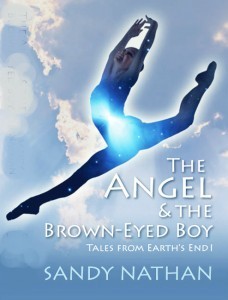
A future world only heartbeats from our own
Author Sandy Nathan has just won the the 2011 IPPY (Independent Publisher) GOLD MEDAL FOR VISIONARY FICTION for her sci-fi /fantasy / visionary fiction novel, The Angel & the Brown-eyed Boy. The IPPY Award Contest is one of the largest and oldest competitions for independent presses––in fact, it may be the oldest and largest.
Sandy says, "Winning this award feels very good. It marks almost four years of work by myself and my publishing team at Vilasa Press. I want to thank my content editor, Melanie Rigney; my book designer, Lewis Agell; and Kathy Grow and Kathryn Agrell for copy editing and proofreading assistance. Many thanks also to my husband, Barry Nathan for keeping Vilasa Press organized and moving forward."
This is the fourteenth national award Sandy Nathan has won with her four books. She has won two Silver Nautilus Awards, and a Bronze and Silver IPPY Award in previous contests. She was a Benjamin Franklin Award Finalist, and has won several Indie Excellence and Best Book (USA Book News) Awards. "It feels good every time. A pat on the back for work well done."
The Angel is the first book of Tales from Earth's End, a series of books about people literally at the end of the earth. In the case of The Angel, that "end" was a nuclear holocaust coming the next day. Later books explore new definitions for earth's extremity.
The award came at a particularly difficult time. The day before being notified of her win, Ms. Nathan's horse, Tecolote, had to be euthanized. "I have been grieving deeply the last few weeks. My horse's heart was failing and the veterinarians couldn't stop it. When I lost that beautiful buckskin horse, I thought my heart would fail. Here's his story, Tecolote: The Little Horse That Could. Teco's story has already won a the 2011 Silver Nautilus Award for Children's Nonfiction (grades 1-6) in its own right.
"The day after we put him down, I won a national award! I guess that God's just telling me that it's not over until it's over. And that happiness and sadness can exist together.
"If you haven't read The Angel & the Brown-eyed Boy, I invite you to do so. It's available in a number of formats."
AMAZON:
Trade Paperback
Kindle 99 cents. Such a deal!
BARNES & NOBLE.COM
Trade Paperback
Nook Book 99 cents. Such a deal!
SONY READER BOOK
I'm told by my distributor that the book is available, but I couldn't find it. Please keep checking. It should be 99 cents.
iBook
I'm told by my distributor that the book is available, but I couldn't find it. Please keep checking. Should be 99 cents.
Here's some information about The Angel & the Brown-eyed Boy, if the book is new to you:
The Angel & the Brown-eyed Boy is Sandy Nathan's new science fiction/fantasy novel. Of the special genre of books and films that include 1984, A Brave New World, and The Prisoner Series, The Angel takes the reader to a dark future world that's not so different from our own. In the late 22nd century, people are continually watched, disappearing off the streets and from their homes. A shadowy but all-powerful government calls the shots; war rages while the authorities proclaim the Great Peace.
All is not bad in this fictional realm, for the angelic extraterrestrial, Eliana, appears on the streets on New York City on a mission to save her planet. As radiant and pure as the world around her is tarnished, Eliana must find the Golden Boy. He turns out to be Jeremy Edgarton, a tech genius on a planet where technology is outlawed, a revolutionary, and the FBI's most wanted. They find themselves caught up in an explosive adventure when Jeremy decodes new transmissions and discovers that a nuclear holocaust will take place the next morning.
The themes of The Angel read like pure sci-fi, but author Sandy Nathan explains, "I'm a former economist. While the love story between Jeremy and Eliana enchants, the back-story––the hideous world around them––is the product of my economist's mind interacting with current events. We're in the worst economic melt-down since the 1930's, with no end in sight. Some events in The Angel are based directly upon history. For instance, Germany's economic distress during the Great Depression is one factor contributing to the rise of Adolf Hitler. Could a totalitarian government arise from our current conditions? Maybe. The Angel's world is just a heartbeat from our own. In writing The Angel, I wanted to entertain my readers and challenge them to discover solutions."
So the book has a vision, a powerful vision, and a dark vision. And it's also got a love story that will melt your heart. The sequel is well into production. Something to look forward to.
Ridin' high!
April 25, 2011
Tecolote: The Little Horse That Could Wins the 2011 Silver Nautilus Award!
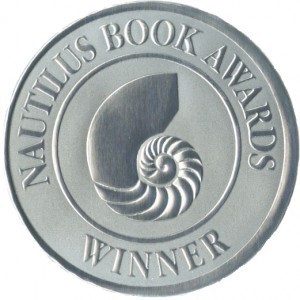
Tecolote: The Little Horse That Could, by Sandy Nathan, is a Silver Nautilus Book Awards Winner!
Press Release. April 25, 2011:
Tecolote: The Little Horse That Could by Sandy Nathan has won the 2011 Silver Nautilus Award for Children's Nonfiction (Grades 1-6).
The Nautilus Award recognizes books, audio books, and e-books that promote spiritual growth, conscious living & positive social change. In addition to its awards for adult literature, the Nautilus Awards recognize distinguished contributions to the worlds of art, creativity and inspirational reading for children, teens and young adults. Previous winners include: Echart Tolle, Thich Nhat Hanh, His Holiness the Dalai Lama and . . . Sandy Nathan . Author Sandy Nathan also won the 2009 Silver Nautilus in the Indigenous/Multicultural category with her novel Numenon. (Once on the link, scroll down to find Numenon.)
"I'm terribly excited about this win," says author Sandy Nathan. "The Nautilus Award means so much to me. It's purpose––recognizing life-enhancing, life-changing literature and spoken art––aligns with my life's purpose––producing books that enhance and change the lives of those around me. I couldn't be happier.
" Tecolote's win is especially meaningful. The little premature and soon-orphaned horse in the book grew up to be my horse. He's the only horse we own who is reliable enough for me to ride. I've got a replaced knee, fused ankle and a couple of other physical dings that make me very cautious about getting on a horse. Tecolote is my boy. He takes care of me.
"One of the things about horses that makes them so special is the way they bond with human beings. Or maybe it's the way we bond with them. Whatever. Teco and I are bonded. That's a sweet experience.
"We thought Tecolote: The Little Horse That Could was a natural for the Nautilus Awards. Tecolote's been inspiring us since he showed us his will to live after being born prematurely and then losing his mother when he was so young. His sweet story of trouble and triumph inspires children and adults."
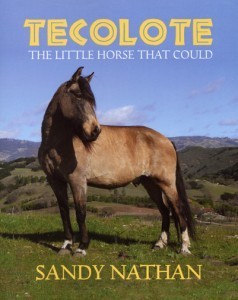
Tecolote: The Little Horse That Could
What are the reviewers saying about Tecolote: The Little Horse That Could?
Tecolote: The Little Horse That Could has a five star average (as high as it can go) on its Amazon reviews. Here are a few words reviewers have said about the book:
Rebecca Johnson, Amazon Top Ten Reviewer: "Sandy Nathan is such a good story teller you will be captivated from the first word until the last. She has included adorable pictures which make the story come alive. This is such a warm and amusing tale it made me laugh out loud a few times. I loved how Sandy Nathan explains how horses grow up and need special attention to be well mannered and tame. This is not just a children's book, it will be enjoyed by people of all ages. What a lovely book."
L.C. Evans, author Talented Horsewoman: "The book is beautifully illustrated with photos of Tecolote and the other horses on the farm. It would be a great gift book for horse lovers of all ages. Tecolote: The Little Horse That Could is written simply enough so children can read it themselves, but it will also appeal to adults."
Zippora Karz, author The Sugarless Plum: I absolutely loved this book! Through Tecolote's journey we feel the love of a mother for her child, (horse for filly and colt), how to find friends, play with them, and create mischief as well. This is a story for any age. I cried and laughed and marveled at all the ways love can be expressed in our lives.
* * *
Tecolote: The Little Horse That Could is available on Sandy Nathan's Web Site and on Amazon in print and Kindle forms.

Tecolote: The Grown-up Horse
From Sandy Nathan: "My preference is the paperback book. It's color, inside and out. The book is beautiful. In addition to all the photos, the print book has a header and footer on each page. The header––a long strip across the top––is clouds and blue sky. The footer is green grass. They emphasize the country feeling of the book."
"On the other hand, you can download the Kindle version in a minute and be reading it. You can't beat the price: 99 cents. I was very pleased at how the pictures came out in the Kindle book. Very clear, though black and white.
"We're working on getting Nook, Sony, and iPad versions ready."
April 12, 2011
My review of Denial of Death by Ernest Becker.
 The Denial of Death by Ernest Becker
The Denial of Death by Ernest Becker
My rating: 5 of 5 stars
WHAT IS YOUR LEGACY?
Becker's Pulitzer Prize winning book was written while he was dying– it is his final gift to humanity. Praised by Elizabeth Kubler Ross, The New York Times Book Review, Sam Keen, you name it. One of my brightest, most humane friends described it as, "The only book I've ever read twice." Becker says– very thoroughly, too– that everything we humans do is to blot out the understanding that we die. That includes all the monuments to our egos we leave behind: shopping centers, vineyards, hotels, motels, cities, piles of stuff for our relatives to clean up, as well as poetry, art, and literature. What is your legacy?
April 11, 2011
SF Review Blogs List––A Comprehensive List of the Major Reviewers of Science Fiction, Fantasy, and Speculative Fiction
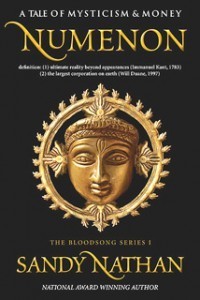
Numenon: A Tale of Mysticism & Money. Accidental sci-fi.
I never thought I was writing fantasy or science fiction. When I wrote Numenon, a book about the richest man in the world meeting a great Native American shaman, I thought the more spectacular bits were write-ups of my meditation experiences. Those who meditate know that visions with lights and Hollywood-type special effects are normal.
Much to my surprise, when the reviews started coming in, Numenon was reviewed as fantasy. Well, wait a minute! I was aiming at literary fiction.
When I wrote The Angel & the Brown-eyed Boy, I realized I'd crossed a line. A story set in a pre-Apocalyptic world some two hundred years in the future whose title refers to an angelic extraterrestrial is definitely sci-fi. Or fantasy.
Not only had I crossed a line, I liked it. I started reading science fiction and fantasy and found that the really good stuff was as emotionally/personally engaging as literary fiction. Not only that, it was FUN!
I've decided to devote space on Your Shelf Life to blog articles about science fiction, fantasy, and speculative fiction, as well as writing by the authors of the above. And reviews. I already post reviews on Your Shelf Life. Now I'll be doing them more often, and inviting guest reviewers to pitch in.
For your edification, I will now attempt to add the SF Review Blogs List, so you'll be able to get in touch with pretty near any SF/Fantasy Blog you want. Including mine.
A B C D E F G H I J K L M N O P Q R S T U V W X Y Z
Romanian French Chinese Danish Portuguese German
A
The Antick Musings of G.B.H. Hornswoggler, Gent.
B
The Billion Light-Year Bookshelf
Book View Cafe [Authors Group Blog]
C
Cheaper Ironies [pro columnist]
D
Daily Dose – Fantasy and Romance
Dave Brendon's Fantasy and Sci-Fi Weblog
E
F
Fantasy and Sci-fi Lovin' News and Reviews
G
Genreville [Publishers Weekly]
The Great Gnome Press Science Fiction Odyssey
H
I
I Hope I Didn't Just Give Away The Ending
The Internet Review of Science Fiction
It is the Business of the Future to Be Dangerous
J
K
L
M
Mad Hatter's Bookshelf and Book Review
Marooned: Science Fiction Books on Mars
Missions Unknown [Author and Artist Blog Devoted to SF/F/H in San Antonio]
The Mistress of Ancient Revelry
N
O
OCD, Vampires, and Rants, o my!
P
Pizza's Book Discussion
Pussreboots: A Book Review a Day
Q
R
Review Haven: Fantasy and Sci-Fi
S
Sci-Fi Songs [Musical Reviews]
T
U
V
Vast and Cool and Unsympathetic
Veritias Omnia Vincula
W
Wendy Palmer: Reading and Writing Genre Books and ebooks
X
Y
Your Shelf Life: How Long Will You Last?
Z
Romanian
Cititor SF [with English Translation]
French
Chinese
The SF Commonwealth Office in Taiwan [with some English essays]
Danish
Portuguese
Fernando Trevisan
Life and Times of a Talkative Bookworm
Science Fiction Made in Brasil
German
A B C D E F G H I J K L M N O P Q R S T U V W X Y Z
Romanian French Chinese Danish Portuguese German
April 8, 2011
The Angel & the Brown-eyed Boy is the Red Room's Book of the Day! April 8, 2011

The Angel & the Brown-eyed Boy
Yes, it's true. The Angel has been selected as Book of the Day by the Red Room. The Red Room is an on-line literary community–– "where the writers are." It's a big site, and I feel honored that they chose me. It also means that I've got to get the word out fast. A day is just a day, after all. (I wonder if this is an extended version of my allotted 15 minutes of fame?)
For the rest of the day, you'll be able to see my smiling face on the Red Room's Home Page. I'm in the middle of the Literary Landscape. Click and you'll be taken to The Angel's Permanent Page which includes a blurb, photos, and an excerpt. No time pressure to see this page.
More great news: Amy Jones has selected me to be her author of the month for April, 2011. Yes, that's this month! Here's a link:
Amy's blog is Amy Jones Young Adult Fantasy Fiction. I'm very grateful to Amy for featuring me.
On Amy's Author of the Month page, you can read an interview, as well as my updated article on How to Win a Book Contest. Many of you will have no interest in this article, except possibly to get an inside look at how compulsive an author must be to win. Many of you will have GREAT INTEREST in the article, because you have just sent your entry packets off to the many contests for independent presses and self-published authors. The winners aren't announced until May. You'll be obsessing, wondering if you missed anything or did anything wrong.
Competing is an anxiety provoking business. I know, I won 12 national awards with my first two books. Almost killed me. I've got The Angel & the Brown-eyed Boy and my other new book, Tecolote: The Little Horse That Could, entered in a passel of contests this year. Is my winning streak over? Did I do everything right? You can read about this right here on Your Shelf Life, my blog for writers. Agonize with me until the winners are announced. (I do accept prayers and good thoughts in support of a happy outcome for my bookies.)
Here are some links:
The Angel & the Brown-eyed Boy
Kindle An amazingly cheap 99 cents!
Tecolote: The Little Horse That Could
Kindle: Coming, probably next week.
We're working on other reader formats, like the Nook and so on. Those should be in place soon.
Thanks so much for being my supporters or showing an interest in my work.
All the best to you and yours,
Sandy Nathan
March 31, 2011
How to Win a Book Contest
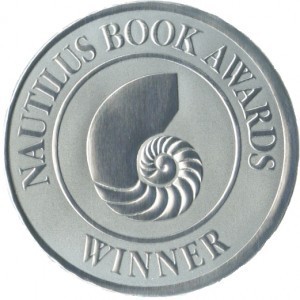
Silver Nautilus Book Award Won by Sandy Nathan's novel Numenon
Book contests are advertised everywhere. Book publishers, publicists and promoters, marketing agencies and other book professionals offer contests. Will winning a book contest increase your book sales and promote your author platform? Will winning a contest increase your book's visibility? Will it create a competitive advantage in today's burgeoning self-publishing and independent press world? Bring you money, publicity, and other goodies? How hard is it to win a book contest? What do you have to do to win?
I'm Sandy Nathan. My first two books won a total of twelve awards in national contests. (See the About the Books drop down menu on my web site for details.) I know about winning book contests, and I offer you what I've learned in two places.
Win Book Contests––Make Your Book a Winner! appeared on this blog a couple of years ago. The article is lavishly illustrated and packed with information. Click on the link to read it now.
HOW TO WIN A BOOK CONTEST is an updated version of the blog article above appearing on Amy Jones Young Adult Fantasy Fiction. I am Author of the Month for April 2011 on Amy's blog. I rewrote my earlier article to incorporate new info and insights. Amy's also featuring an interview with me that may give you insights about the creative process. Or my creative process, anyway.
Please check either or both articles for my tips on how to be a book contest winner. They're packed with more information than you get in some seminars or books.
April is an edgy month if you've entered a book contest. Most of the contests are closed. You've gotten your entry packet in, after much work and obsessiveness. Now it's a matter of waiting for the contest judges to select winners––and tell you if you're one of them.
Good luck, entrants! If you've read my articles and utilized the information, you stand a good chance.
I'm in the same boat you are, by the way. I've got two new books out which have been entered in contests for the first time. The Angel & the Brown-eyed Boy, my sci-fi/fantasy about an angelic visitor from another world and a 16-year-old revolutionary and genius, came out in 2011 and is entered in three contests. Tecolote: The Little Horse That Could, the heartwarming story of a premature horse born on our ranch, is entered in four. I'm in the hot seat waiting for results.
No guarantees in life. No guarantees in book contests. The fact that I've won in the past doesn't mean that I'll win in the future. Heartening news? Realistic news. I like to stay in the real world in my nonfiction––and this article is definitely nonfiction.
Here's a few more goodies for those of you wanting to enter contests for self-publishers and independent presses. A few links to lists of contests:
SPR Self Publishing Review––Self-published Book Review
PUBLISHING BASICS––A Book Award Adds Value to your book
Reader Views––Annual Literary Awards
As of this writing, most of the contests are closed for 2011, though you can still get into the Best Books of 2011 by USA Book News and the National Indie Excellence Award if you're fast. Best Book's is accepting books through April. Indie Excellence closes on April 10th.
[image error]
This photo is a contest winner: The winner of an "It's not my job contest." It's also how you may feel when you get that last contest entry off in the mail.
AND––I'll be posting another article on winning book contests in a few days. I wrote the article as I sat surrounded by the rubble of materials needed to get my book contest entries off. It's my "What's it all about, Alfie?"––if you remember the song by the same name in the movie of the same name. What is this winning contests all about?
Happy days! Good luck!
Sandy Nathan
YourShelfLife.com

